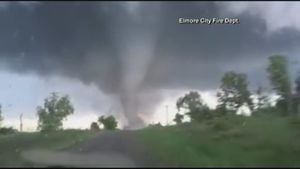The impact of climate change is no longer just a topic for researchers and environmental activists; it has infiltrated daily life across various regions, leading to extreme weather events ranging from scorching heat waves to torrential rain and devastating wildfires. Recent reports highlight how rapidly changing weather patterns, linked to human activity, are reshaping the climate we live in. This summer has officially set records as the hottest on record for the Northern Hemisphere, with the United States experiencing relentless heat waves. Reports indicate cities like Phoenix faced temperatures exceeding 100 degrees for over 100 consecutive days, bringing challenges to residents and the environment alike.
The summer of 2024 marked a particularly alarming peak, with the National Oceanic and Atmospheric Administration (NOAA) recording August as the hottest month since records began 175 years ago. This rise isn’t just numbers on paper; it's hitting the ground hard, putting stress on natural resources, ecosystems, and elevatory mental health concerns.
So what is driving these extreme conditions? The jet stream—an upper-atmospheric phenomenon—is playing a significant role. Under normal circumstances, the jet stream helps to regulate weather patterns as it moves from west to east across the globe. Presently, the jet stream is exhibiting wavier patterns than usual, often causing prolonged high-pressure systems, known as heat domes, to settle over specific areas. These atmospheric blocks can result in excessive heat accumulation, which becomes unbearable for those living underneath. Areas affected by these stagnant heat waves are also becoming familiar with the term “heat dome,” which refers to these persistent high-pressure systems made worse by warming temperatures caused by climate change.
Interestingly, as the polar regions of the Earth heat up faster than the tropics—a phenomenon known as Arctic amplification—the temperature difference affects jet stream stability, leading to more pronounced local weather extremes. Although many are familiar with heat waves, less known are the series of droughts accompanying these heat episodes. For example, Arizona has been under drought conditions since 1994, with no significant period of respite. This persistent dry spell has resulted in immeasurable stress on water supplies, agriculture, and wildlife.
Significantly, events like tropical storm Norma in 1970, which marked one of the deadliest storms recorded in Arizona's history, remind us of how weather misalignments can turn catastrophic. This storm, along with the tragic history of large wildfires, like the Yarnell Hill Fire from 2013, paints a strong picture of how extreme weather has disastrous ramifications, leading to loss of life, destruction of habitats, and putting emergency responders at risk.
Looking forward, experts are concerned about how climate change will continue to catalyze these types of weather patterns. With the increasing frequency of extreme weather events expected, cities and states across the U.S. and globally are now forced to rethink their approaches to preparedness and infrastructure. Many municipalities are working diligently on enhancing public safety measures—improved heat shelters for extreme temperatures, updated building codes to withstand stronger storms, and more resources for first responders during wildfires.
The discussion isn't solely about reaction; there is also dialogue surrounding proactive measures. Transitioning to renewable energies and reducing carbon emissions continues to be emphasized, as these efforts are seen as pivotal to lessening the adverse effects of climate change and mitigating future weather extremes. Investment toward sustainability is no longer optional, but rather necessary if societal norms are to align with the challenges posed by climate disruptions.
So, the question remains: with the climate shifting under our very feet, how can individuals, communities, and governments adapt to protect both people and the planet? This call for cooperation—for intertwined efforts to heal our planet and refocus our lives—is more important now than ever.
What is overwhelmingly clear is the urgency imbued within these discussions. Scientists are calling for community awareness and educational outreach to deal with the imminent threats posed by climate change. The need for everyone—from policymakers down to the individual—to understand the interconnectedness of our actions and the environment cannot be stressed enough. Whether it's advocating for local initiatives or supporting global agreements, each small effort can contribute to long-term solutions.
It’s apparent. The impacts of climate change are not distant predictions but are already part of daily life. The challenges may be overwhelming, but the narratives of resilience and potential solutions arise daily from varied corners of the globe. Individuals armed with knowledge can stand resilient against these challenges, finding ways to mitigate impacts, advocate for change, and build more sustainable, prepared communities.
Extreme weather events, shaped by climate change, remind us of the delicate balance our world maintains and how precarious conditions can become without intervention. The heatwaves, storms, floods, and fires are nature's loud calls, imploring humanity to respond with the urgency the situation demands.



